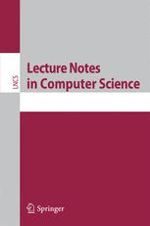
Impressum
Kundeninformation
 |
|
|||
Lecture Notes in Computer Science (LNCS) |
Kontakt/Bestellung |
|
Online |
|
|
Inhalt :: Content Sammlung der aktuellen und (sofern elektronisch verfügbar) der zurückliegenden Ausgaben der Springer-Reihe "Lecture Notes in Computer Science (LNCI)". Die seit 1973 in Printform erscheinende Reihe publiziert wissenschaftliche Originalbeiträge (Tagungsbände, Proceedings und Post-Proceedings sowie Monographien) aus dem gesamten Gebiet der Informatik und der Informationstechnologie einschließlich der angrenzenden interdisziplinären Anwendungsgebiete. Eine besondere Stellung haben dabei die Kryptologie und die Künstliche Intelligenz ("Lecture Notes in Artificial Intelligence"). Mit seinen renommierten Autoren und Herausgebern aus Forschung und Entwicklung im universitären und industriellen Umfeld gelten die LNCS als international führende Publikationsplattform. Die Reihe gliedert sich in acht Unterreihen. Abgedeckter Zeitraum: 1997 ff. Updates: laufend. Jährlicher Zuwachs: rund 500 Bände. |
 |
|
Verlag :: Publisher Springer Nature |
|
|
Preis :: Price Preise auf Anfrage / Prices on request |
|
|
Das Angebot richtet sich nicht an Verbraucher i. S. d. § 13 BGB und Letztverbraucher i. S. d. PAngV. |
|
|
ISBN/ISSN
0302-9743 Bestellnummer bei digento :: digento order number 102752 |
|
|
Verlagsinformation :: Publisher's information The series Lecture Notes in Computer Science (LNCS) has established itself as a medium for the publication of new developments in computer science and information technology research and teaching - quickly, informally, and at a high level. The cornerstone of LNCS's editorial policy is its unwavering commitment to report the latest results from all areas of computer science and information technology research, development, and education. LNCS has always enjoyed close cooperation with the computer science R & D community, with numerous renowned academics, and with prestigious institutes and learned societies. Our mission is to serve this community by providing a most valuable publication service. LNCS commenced publication in 1973 and quite rapidly attracted attention, not least because of its thus far unprecedented publication turnaround times. The 1980s and 1990s witnessed a substantial growth in the series, particularly in terms of volumes published. In the late 1990s we developed a systematic approach to providing LNCS in a full-text electronic version, in parallel to the printed books. Another new feature introduced in the late 1990s was the conceptualization of a couple of color-cover sublines. Still, original research results reported in proceedings and postproceedings remain the core of LNCS. Subseries SL 1 Theoretical Computer Science and General Issues
SL 2 Programming and Software Engineering
SL 3 Information Systems and Applications, incl. Internet/Web, and HCI
SL 4 Security and Cryptology
SL 5 Computer Communication Networks and Telecommunications
SL 6 Image Processing, Computer Vision, Pattern Recognition, and Graphics
SL 7 Artificial Intelligence (LNAI)
SL 8 Bioinformatics (LNBI)
|
|